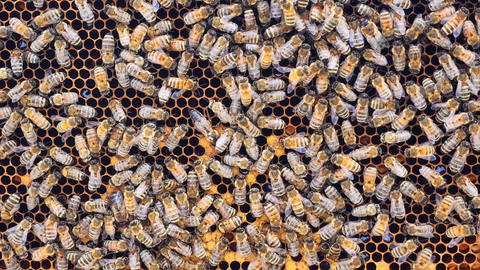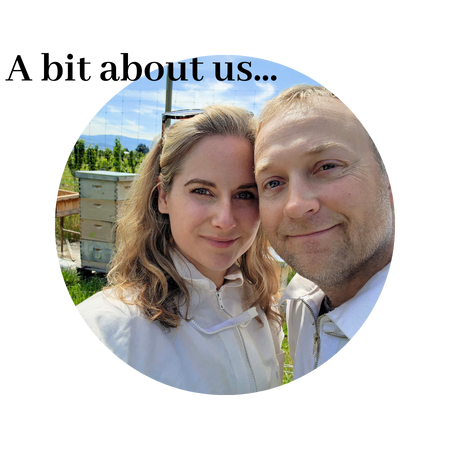Beekeeping is an activity that goes back thousands of years. This insect version of animal husbandry has benefited people in many ways over the course of human history and is still widely popular today.
Beekeeping is a fantastic hobby to take up, as you learn all about the intricate details and lives of bees, and it is extremely interesting. Beekeeping is relaxing and educational and you get the benefits of honey and beeswax, which you can use to make natural food wraps, beeswax candles and more.
Here are the pros and cons of beeswax candles.
There is a lot to know about beekeeping though, and the best place to start is by researching beginner beekeeping, and learning about the bees, the jobs of the bees, the job of the beekeeper and the time commitment for beekeeping.

What Is Beekeeping
Beekeeping (also called apiculture) works by capturing or raising honey bee colonies in hives that are designed to be easily moved around for pollination, and easily accessed for honey removal, bee feeding and pest and disease control.
In this article, we discuss the overall process of modern beekeeping.

Beginner Beekeeping | How Beekeeping Works
When first looking into beginner beekeeping, there are some basics that are good to know about. In this article, we will talk briefly about:
- Beekeeping history
- The bees themselves
- How bees stay alive in the winter
- The beekeeper
- Feeding your bees
This article will give you some basic knowledge on beginner beekeeping. Once you have a foundation and you would like to know more, you can read about the beekeeping equipment you need to get started.
Let's start by looking at the history of beekeeping.
Beekeeping History
The earliest record of beekeeping or apiculture (from the Latin word "api", which means bee) is taken from depictions on the walls of the Sun Temple, built by the Ancient Egyptian Pharaoh Nyuserre Ini, located near the Nile River in Egypt (map here).
This Pharaoh reigned around 4500 years ago. The Sun Temple was meant to be the home of the Pharaoh's funerary cult and the source of their income after his death. Maybe a portion of that income was from beekeeping? We will never know.

Modern beekeeping underwent some significant changes with the discovery of the "bee space".
What is the bee space?
The bee space is the distance that gives honey bees enough room to move around in, but is not so large that bees start to build comb. This bee space is the foundation of the modern hive design, known as the Langstroth hive, developed and patented in 1852 (you can check out that patent here).
This honey bee hive design is what beekeepers still use today 170 years later, and is the same honey bee hive design we use in our own backyard farm.
Honey Bees
Honey bees (Apis Mellifera) are a made of the honey bee castes: the queen bee, worker bees and drones. There can be as many as 60,000 bees in a single colony.
The colony has one goal - create more honey bee colonies. With this goal as the driving force behind the honey bee colony, the bees use pheromones to communicate and collectively grow the number of bees in the hive.
Once the number of bees in a single honey bee hive reaches a tipping point, the queen leaves the hive with 50%-60% of the bee population. She starts a new bee hive in a new location while the workers that were left behind raise a new queen.
How Do Honey Bees Stay Alive In Winter?
Bees know when winter is coming. For bees, this is a time when there are no resources to stay alive. Their solution? Honey, and lots of it.
Honey bees work tirelessly through the summer months putting away this high-density food source (honey) to eat and survive through the winter.
Worker bees venture out into the world in search of nectar to make their golden elixir. In truth, the queen, workers, and drones all have much more to their story but for the purposes of this beginner beekeeping article, it is a quick guide.
There are many more resources on this website, and you can explore them yourself in our bees + honey section or find them at the bottom of this article.

The Beekeeper
The humble beekeeper is an individual who wants the best for his/her bees because what's good for the bees is good for the beekeeper. Beekeepers put all their effort into ensuring the honey bee population is high for the local nectar flows. The more bees, the more honey, naturally.
The job of the beekeeper is to keep a close eye on the hive to make sure there are no problems (such as mites) and he or she makes sure that there are no swarms about to happen.
The beekeeper develops their intuition by simply learning about the bees themselves. A beekeeper will begin to know what to look for along their beekeeping journey. It will all fall into place. As a beginning beekeeper, your best friend will become your bee hive smoker. you will use it to calm your bees so they allow you top open up the hive with your hive tool to inspect it.
See the bee smokers available here
Check price of hive tools here
Just know, that the ultimate goal for any beekeeper is to keep a happy, healthy beehive. From that you will gain beekeeping knowledge and you will be harvesting honey in no time.
You can also check out the gift guide we wrote and find some of the best gifts for beekeepers. These are great items to have on hand.

How Often To Inspect A Bee Hive
Beekeepers should inspect a honey bee colony hive once per week. They know the subtle signs of honey bee health by just looking at the frames in the brood nest and the adult bees that are on them.
If you ask an experienced beekeeper what they are looking for as they look over each bit of wax comb, they will tell you "just looking". There is a long list of things to look for when you are a beekeeper. Going through a written beekeeping checklist just doesn't work, the bees can't wait that long.
When a beekeeper opens up the hive boxes or the hive body, the bees know it. And they don't exactly like it. Some colonies are more tolerant of this than others but even the very gentlest of bees get annoyed when the hive is left open for too long.
Once the beekeeper and the bees have made it through the local nectar flow it's time for the beekeeper to harvest that valuable resource. But is that fair to the bees? Their hard-earned honey going to disappear?
No worries, the beekeeper knows exactly how much honey to leave in the hive for them to make it through winter. If the bees are going to be short on honey, the beekeeper will feed them inexpensive sugar syrup.
Feeding Honey Bees
Feeding bees before winter is very important for both the honey bees and the beekeeper. If the bees don't have enough food stored up, they very quickly starve. This isn't just a sad end for the bees of that colony, it is also sad and is a very big expense for the beekeeper.
When the bees are fed sugar syrup (just regular granulated sugar dissolved in tap water) they convert it into honey. This honey can't be sold by an honest beekeeper, it is fake honey as far as humans are concerned. Bees love that sugar syrup though.
A full-size colony can harvest a gallon of sugar syrup in 2 days! Needless to say, the beekeeper is very busy this time of year and is visiting their hives every few days.
Once winter comes, the bees settle in for the season. They rarely leave the hive, only doing so for cleansing flights, where they defecate outside the hive.
In some very cold places, bees don't leave the hive all winter. The worker bees cluster around the queen, keeping her warm. They move around the hive thawing out honey as they need it, all while keeping the queen bee warm and in the center of their circle.
Once winter is over, the colony numbers will have fallen significantly. The beekeeper is back at it again, inspecting each honey bee hive to determine what its needs are. Usually, that means feeding them again. The goal is to get the number of bees back up so when the spring and summer nectar flows arrive, they can do it all over again.
Conclusion
The honey bee and the beekeeper have a symbiotic relationship. In most places in the world, honey bees can't survive without a beekeeper watching out for them. Likewise, the beekeeper trade would not exist without the honey bee.
Here are some other articles you may be interested in reading:
BEST Uses For Beeswax In Your Home
Beekeeping Equipment List | How To Start
How To Polish Furniture With Beeswax
Did you like this article?
❤️ Here's how you can support our blog:
My name is Linnea and I am a backyard gardening enthusiast! Along with my husband and our two kids (and chickens, ducks and our little dog Izzy). Our hobby - growing our own food and making our meals from scratch. My blog, The Farmers Cupboard, is the website that blossomed from that passion. I love every second I spend sharing our hobby with like minded backyard growers.
It's easy to support my blog, and it is so appreciated. Please SHARE an article somewhere, pin a photo to your Pinterest board, follow on any of our social medias or sign up for our newsletter! That's it!
These little things help our blog grow and allow us to continue doing what we love: growing good food and sharing what we learn.
PINTEREST PASSIONATE? We're opening up our cupboard to you!
Click on the pin below made just for you. It will bring you right to my little Pinterest community, where I would love for you to FOLLOW The Farmers Cupboard and see all of our gardening and backyard dream ideas!
Let's grow good things together!












0 comments